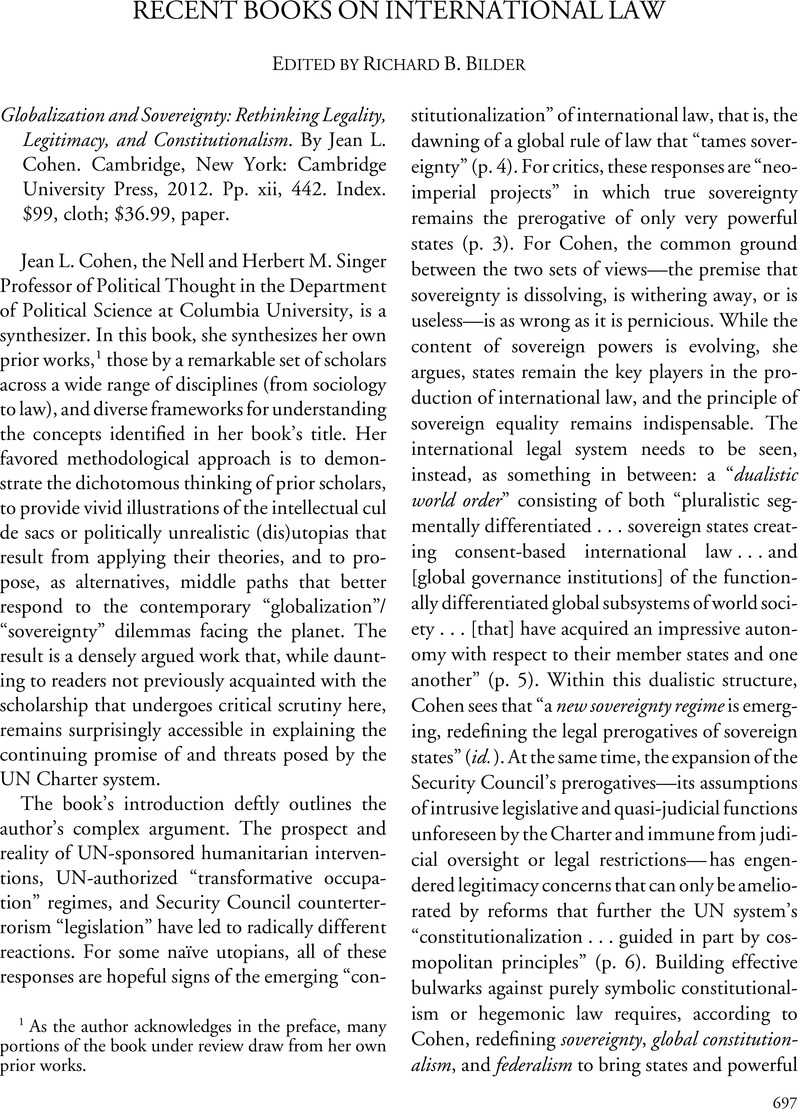No CrossRef data available.
Published online by Cambridge University Press: 20 January 2017

1 As the author acknowledges in the preface, many portions of the book under Review draw from her own prior works.
2 Abram Chayes & Antonia Handler Chayes, The New Sovereignty:Compliance With International Regulatory Agreements (1998).
3 As Cohen explains, “bund” is Schmitt’s word for “a federation of states that is distinct from Afederal state” (p. 116).
4 Henkin, Louis, That “S” Word: Sovereignty, and Globalization, and Human Rights, et Cetera, 68 Fordham L. Rev. 1 (1999)Google Scholar.
5 Convention for the Amelioration of the Condition of the Wounded and Sick in Armed Forces in the Field, Aug. 12, 1949,6 UST 3114,75 UNTS 31;Convention Respecting the Laws and Customs of War on Land, Oct. 18, 1907, 36 Stat. 2277, 1 Bevans 631; SC Res. 1483 (May 22, 2003).
6 SC Res. 1373 (Sept. 28, 2001); SC Res. 1540 (Apr. 28, 2004).
7 Case T-306/01, Yusuf v. Council, 2005 ECR II-3533, para. 77 (Eur. Ct. First Instance); Case T-315/01, Kadi v. Council, 2005 ECR II-3649, para. 58 (Eur. Ct. First Instance).
8 See, e.g., Interdisciplinary Perspectives on International Law and International Relations: The State of the Art 10, 649 (Jeffrey L. Dunoff & Mark A. Pollack eds., 2013) (noting the “grossly unbalanced disciplinary terms of trade between political science and law” where lawyers use international relations theory far more than political scientists deploy International legal theory).
9 see Clark, Grenville & Sohn, Louis B., World Peace Through World Law (2d ed. 1960)Google Scholar; Symposium, Realizing Utopia: Reflections on Antonio Cassese’s Vision of International Law, 23 Eur. J. Int’l L. 1031 (2012).
10 Martti Koskenniemi, From Apology to Utopia:The Structure of International Legal Argument (2005).
11 See, e.g., Rosand, Eric, The Security Council as “Global Legislator”: Ultra Vires or Ultra Innovative? , 28 Fordham Int’l L.J. 542 (2004)Google Scholar; see also Johnstone, Ian, Legislation and Adjudication in the UN Security Council: Bringing Down the Deliberative Deficit, 102 AJIL 275 (2008)CrossRefGoogle Scholar.
12 See generally Steiker, Carol S., Punishment and Procedure: Punishment Theory and the Criminal-Civil Procedural Divide, 85 Geo. L. J. 775 (1997)Google Scholar.
13 see Grant, Ruth W. & Keohane, Robert O., Accountability and Abuses of Power in World Politics, 99 Am. Pol. Sci. Rev. 29 (2005)CrossRefGoogle Scholar.
14 See, e.g., Reinisch, August, The Immunity of international Organizations and the Jurisdiction of Their Administrative Tribunals, 7 Chinese J. Int’l L. 285 (2008)CrossRefGoogle Scholar; Antonios Tzanakopoulos, Disobeying the Security Council:Countermeasures Against Wrongful Sanctions (2011).
15 see Rosand, supra note 11, at 578–87 (noting that the Council gives states considerable autonomy in how to implement the Council’s counterterrorism sanctions and that this flexibility might be regarded as another “safeguard” against the risk of abuse of power).
16 See generally Eric Rosand, Alistair Millar & Jason Ipe, The Un Security Council’s Counterterrorism Program: What Lies Ahead? 10 (2007), available at http://www.globalct.org/publications/the-un-security-councils-counterterrorism-program-what-lies-ahead (noting the difficulties related to assessing compliance with the Council’s sanctions and stating that none of the relevant Council subcommittees had referred, atleast by 2007, a single state to the Council for noncompliance).
17 Michael Hardt & Antonio Negri, Empire (2000).
18 See, e.g., Boon, Kristen E., Open for Business: international Financial Institutions, Post-conflict Economic Reform, and the Rule of Law, 39 N.Y.U. J. Int’l L. & Pol. 513 (2007)Google Scholar; Graham Harrison, The World Bank and Africa:The Construction of Governance States (2004).
19 See generally Joseph Stiglitz, 1998 Wider Annual Lecture: More Instruments and Broader Goals: Moving Toward the Post-Washington Consensus (Jan. 7, 1998), available at http://www.wider.unu.edu/publications/annual-lectures/en_GB/AL2.
20 Waldron, Jeremy, Are Sovereigns Entitled to the Benefit of the International Rule of Law?, 22 Eur. J. Int’l L. 315 (2011)CrossRefGoogle Scholar; see also Chesterman, Simon, An International Rule of Law?, 56 Am. J. Comp. L. 331 (2008)CrossRefGoogle Scholar.
21 Waldron, supra note 20, at 325–26.
22 Indeed, Rosand argues that the Council should not undertake to “legislate” (as it did in Resolution 1373), except in “exceptional” circumstances; for him the Council’s “selectivity” may enhance its legitimacy. Rosand, supra note 11, at 579–81.
23 see SC Res. 1593, para. 6 (Mar. 31, 2005);SC Res. 1970, para. 6 (Feb. 26, 2011).